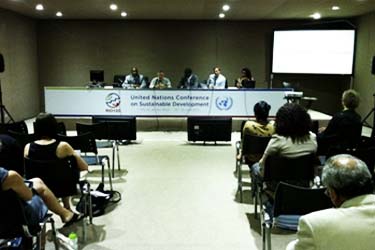Reflections on Advancing Women’s Empowerment Beyond Rio+20
You may ask: what exactly is “women’s empowerment” and how can we support this effort to promote sustainable development in a comprehensive and long-term way, while at the same time respecting human rights?

See all our coverage of Rio+20 here.
Last month, I represented Pathfinder International as a co-panelist for a side event at the UN Conference on Sustainable Development, also known as “Rio+20.” I was joined by colleagues from Population Action International, African Institute for Development and Population, United Nations Population Fund, and the International Planned Parenthood Federation / Western Hemisphere Region. Our aim was to discuss climate change, the global unmet need for family planning services, and human rights-based population policies, in an effort to underscore the linkages between climate change, sustainable development and women’s empowerment. Understanding those linkages is essential to efforts to reducing global poverty, advancing social equity, and protecting the environment – the primary aim of Rio + 20.
You may ask: what exactly is “women’s empowerment” and how can we support this effort to promote sustainable development in a comprehensive and long-term way, while at the same time respecting human rights? For Pathfinder, our approach is multi-faceted. To fulfill our global mission to ensure sexual and reproductive health and rights for women and men, we take a holistic approach to improving people’s lives by strengthening both the community system and the health system. In partnership with the local community, we promote the effective engagement of ordinary citizens, leaders, social activists, and civil society groups in policy, legal, cultural, and governance frameworks that affect the effective operations of health systems. While doing this, we work on institutionalizing a more democratic and open process of engaging women and youth, reinforcing community networking capabilities, and advancing policy advocacy to promote structural change. Through these processes, more women and young people will be invited to participate in dialogues to ensure that governments are held responsible for the commitments they make to advancing health. In the end, another desired outcome is an increased level of community self-reliance—a heightened capacity among people to apply local solutions to problems that stand in the way of improved health for all and a sustainable future. Thus in my presentation at Rio+20, one of my recommendations was instituting proper governance and increased participation of the civil society as one of the critical building blocks for sustainable development.
While there is much room for improvement in the Rio+20 outcome document, it contains welcome language on sexual and reproductive health, gender equality and women’s empowerment. Moving towards the next set of development goals, it is imperative that the global community understands the dynamic and diverse nature of the local contexts in the developing world, and that we continue to refine our approaches to promoting these important priorities around sustainable development from a variety of angles. The collective power and voices of all citizens must be tapped. In particular, I noted that we must collaborate more deeply across health and community development sectors to ensure that our future and the future of our children will indeed be a bright one.

